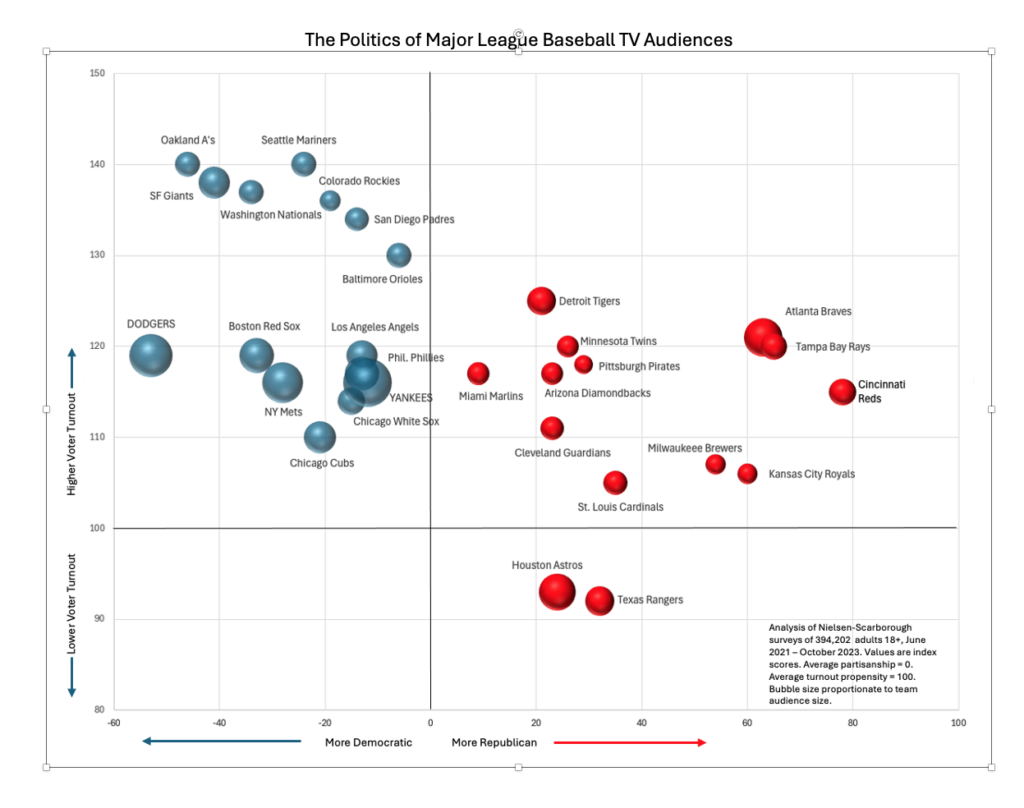A Left-Field World Series for Election 2024

Politics and Major League Baseball have a lot in common. Both are national pastimes with passionate partisans. Managers, in campaign headquarters and team clubhouses, increasingly make decisions based on analytics. Both are games of small margins, and often played by celebrities.
Like politics, all baseball is local. Fans are much more attached to their local franchises than to MLB in general (you turn on the TV to watch your team.) This is different than the NFL, where the brand is the “shield” (you turn on the TV to find an NFL game) or the NBA, where the brand is the player (you turn on the TV to see LeBron or Steph play).
Which brings us to this year’s World Series between the two most iconic and valuable baseball franchises – the Los Angeles Dodgers and New York Yankees. Given the strongly Democratic politics of their fan bases, this will be a far left-field World Series.
We’ve analyzed 394,202 Nielsen-Scarborough interviews with American adults to determine the partisan differences among each MLB franchise’s fan base. Unsurprisingly, the distribution appears to be largely a function of political geography.
The fans of franchises in blue cities in blue states – such as the Dodgers, Yankees, Mets, Giants and Red Sox – lean strongly Democratic. As you move rightward on the chart, regional reach and red state politics come into play. The Atlanta Braves, with a following across the South, have one of the larger and more Republican fan bases. Cincinnati Reds fans are the most red.

Despite the largely Democratic fan bases of the Yankees and Dodgers, expect to see ads from both parties if you’re watching the remainder of this year’s Fall Classic. And it’s not just because former President Donald Trump is a Yankees fan. It’s because political media buyers know that baseball fans are high turnout voters.
Even as the two teams in the 2016 World Series final were being decided, the Trump campaign quietly bought a package of national network ads in what would turn out to be the historic seven game battle between the Cleveland Indians and the long-suffering Chicago Cubs. Clinton ad trackers began picking up Trump’s World Series spots in markets across the country and realized it was a network buy.
The Clinton campaign quickly placed a last-minute order for their own network World Series spots.
Both campaigns had ads in the Cub’s victorious game seven which earned a Nielsen rating of 40-million viewers, making it the most-watched baseball game in 25 years.
Along with the Super Bowl and March Madness, the World Series is one of the largest and most bipartisan television audiences available — no matter who’s playing. As we’ve previously written, major sporting events offer one of the few opportunities for campaigns to reach attentive likely voters in real-time. Fans actually watch sports as they happen, which means a voter might actually watch an ad rather than fast-forward through it.
This reach comes at a price. For example, if a pro-Harris PAC wants to run base-motivating World Series thirty-second ads in the Los Angeles and New York markets, those two spots together could cost around $350,000. Buying the whole country on the network might be a better deal at about $525,000 per spot, depending on the game.
There was a time when World Series ads weren’t so expensive and Dodger fans weren’t so Democratic. The Yankees and Dodgers last met in the World Series in 1981 when the political figure most associated with the Dodgers was a long-time fan and former baseball radio announcer named Ronald Reagan.
He won 53 percent of the Los Angeles County vote against Jimmy Carter in 1980, and the 1981 Dodgers won the series 4-2 against the Yankees.
The Biden-Harris ticket in 2020 won 71 percent of the Los Angeles County vote. Harris’ husband, Doug Emhoff, is a LA-born-and-raised Dodger fan. Meanwhile, Harris started her political career in San Francisco and wears Giants gear on social media.
On the other side, Trump was born a Yankee fan, growing up in Queens before he got himself to Manhattan. The Trump-Yankee connection peaked while Trump pal George Steinbrenner ruled the Bronx until 2010. Yankee fans are Democratic, but Trump will likely want to head again up to the Bronx and Yankee Stadium. Maybe spend a couple of innings working the counter at one of the stadium’s many high cost concessions. Picking up the tab will be pricey but the free media will be priceless.
Will Feltus is a Republican media researcher at National Media in Alexandria, Virginia and co-author of “Inside Campaigns,” a textbook on campaign management published by Sage/CQ Press.
Mike Shannon is a partner at the management consulting firm Vianovo in Austin, Texas, and served on the polling and media teams of two winning presidential campaigns.
